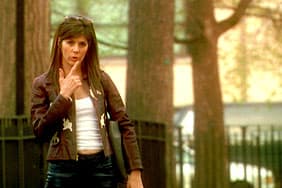At first, Just a Kiss seems like it's going to be another one of those self-indulgent indie films about the relationships of young artistic types, made by actors for actors about actors (think last year's The Anniversary Party). Thankfully though, this film transcends the narrow confines of that genre by taking increasingly surprising turns for the dark and weird and by employing an unconventional narrative structure that pushes the plot into the realm of the fantastical. The story begins with one adulterous kiss between Dag (Ron Eldard) and Rebecca (Marley Shelton) and chronicles the ripple effects of this infidelity, which end up eventually decimating the love lives of several New York City couples. The first to be affected are Peter (Patrick Breen, who also wrote the screenplay), Rebecca's boyfriend and Dag's best friend, and Halley (Kyra Sedgwick), Dag's long-time girlfriend. Their web of misery spreads to encompass Andre (Taye Diggs), a smooth-talking cellist, Colleen (Sarita Choudhoury), an adventurous stewardess, and Paula (Marisa Tomei), a somewhat unstable bowling alley waitress.
The film basically captures the downward spiral of bad decisions that catapult these characters into a grotesquely bleak situation by the end of it all. Director Fisher Stevens throws into the live action touches of the rotomation style of animation that was popularised by Waking Life, used sparingly in this film to highlight these moments of bad decision making. The strength of the film lies in how absurdly far the negative repercussions of the characters' choices are taken, and its use of a dark twisted humour to portray the disastrous consequences. This makes what begins as a fairly clichéd story morph into more of a contemporary fable, the fantastical nature of which paves way for the clever structural licence taken with the surprise ending.
The film basically captures the downward spiral of bad decisions that catapult these characters into a grotesquely bleak situation by the end of it all. Director Fisher Stevens throws into the live action touches of the rotomation style of animation that was popularised by Waking Life, used sparingly in this film to highlight these moments of bad decision making. The strength of the film lies in how absurdly far the negative repercussions of the characters' choices are taken, and its use of a dark twisted humour to portray the disastrous consequences. This makes what begins as a fairly clichéd story morph into more of a contemporary fable, the fantastical nature of which paves way for the clever structural licence taken with the surprise ending.
